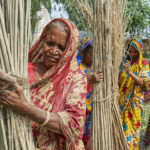
The UN climate conference COP26 began this weekend in Glasgow, Scotland. This COP is being held in the shadow of the COVID-19 pandemic and as the need for urgent action to address climate change is getting increasingly desperate. All around the world, people, communities, churches, and civil society are raising their voices calling for ambition, for action, for an end to weak commitments.
At previous COPs, many of those voices would be heard in the halls of the COP itself, with a vigorous mix of attendees from around the world. But this year access has been severely limited.
COVID-19 restrictions, equitable access to vaccines, and changing requirements left many from the Global South sitting at home, unable to even reach Scotland for the conference. The cost has left others behind as well.
The Guardian posted a story on the weekend saying that this COP would be the whitest and most privileged ever.
And this is bad news for climate justice.
Because we need to have everyone in the room to be part of the conversation if we want to make meaningful changes that will protect and support the most vulnerable.
Women. Youth. Indigenous people. People from vulnerable communities. They all need to be in the room, at the table, and part of the conversation.
And yet social media is full of questions about how to follow events online, about how to get tickets to rooms for those who are in Glasgow. The hashtag #MissingVoicesCOP26 is capturing the situation.
And, if we are truly committed to transformative and inclusive climate action, that must change. COP26 cannot be a success without ambition, and that ambition will not be strong without the voices of all these individuals and groups represented in the debates.
But these voices are absent in 2021.
For example, Bidyanqth Bhurtel, an ACT Alliance delegate who unfortunately was not able to make his way to Glasgow from Nepal states that: “For a person who looked to travel to the UK for the first time from a country like ours in itself is quite a hassle even in normal times. I regularly checked the procedures, contacted the visa service providers here and got to conclusion that I am simply not confident to travel to Scotland, mainly because Nepal was on the red list. There was no time or energy for me to prepare for all the details in order to meet all requirements.”
James Bhagwan, from the Pacific Conference of Churches, contrasts the situation at COP26 with the Pacific practice of talanoa, which COPs have adopted as a dialogue method since 2017. “In our Pacific context, when we gather for important decisions, we sit together on the mat, to talanoa, to discuss from the heart, for everyone to speak. The meeting does not begin until the last person who needs to be there arrives and is seated on the mat. This year there are many empty spaces on our mat. The meeting begins without them. You cannot have real talanoa if everyone, governments and civil society etc are not all sitting on the mat, together. We who are here from the Pacific bring the voices of those who could not come. More than ever We must be given the space, the microphone and the time to speak our truths, to share our stories. And we must be heard. The decisions made at COP26 must take into account what we are telling the world. ”
Jamilet Azucena Ñontol Infante, from SEPEC, Lutheran Church, Peru, was fortunate to be able to come to COP, and describes her experience, “It was hard for me to come to COP26. I live in Peru with my family, and I do a lot to help them. I did not have a passport, I had never been on a plane. My family was so proud of me for getting to do these things! But because I am a young person, I was not eligible to get the COVID-19 vaccine until just before COP and I could only get one dose so far. So I had to quarantine for 10 days when I got to the UK. This means that I am away from my family for a long time. I am lucky that they can spare me from the work at home for many weeks to come to COP- most other families are not so lucky.”
We call on the UNFCCC Secretariat and UK COP26 Presidency to put an end to the ticketing system in the COP venue and to put in place inclusive, participatory and transparent methods of participation online for those who were left at home.
There is time to make this COP a success, to be a big step towards strong climate justice, but it must happen now, as the debates begin, and not wait until it is too late for these vital voices to be present in the room.